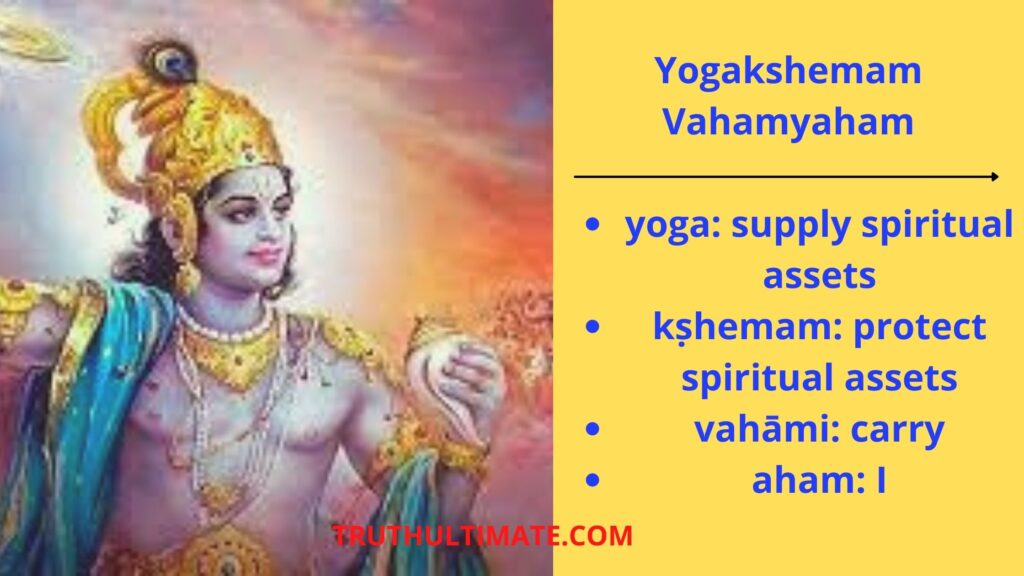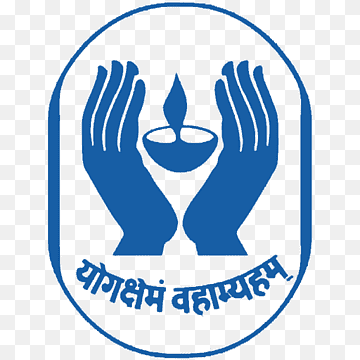Yogakshemam Vahamyaham is a great verse of the Bhagavad Gita, which assures “I will take care of my devotees, securing and protection.”
Although, the sloka or a verse is a part of the Bhagavad Gita and leads us to the zone of spirituality.

But, it came to our lives more when we see that used as the LIC logo or motto.
Just as the other Bhagavad Gita slokas, this one has a deep meaning as well.
Many people, many opinions often misinterpret the meaning of this particular sloka, and most of the time takes away the essence of this beautiful verse.
So, let us explain the true meanings of this phenomenal verse with preserving its essence and clearing your doubts regarding it.
Yogakshemam Vahamyaham Meaning
The literal meaning of this sloka of Bhagavad Gita actually is “I will take care of my devotees, securing and protection.”
However, you may have seen it with some misinterpreted meanings as well. Sometimes, people often take this sloka in a material sense.

For instance, if a person is starving for two days and then somehow gets some food. The person then often considers that God has secured it for him.
Obviously, we do not deny it, and in a sense, nature itself indeed takes care of things. But that isn’t the true meaning of the sloka here.
Yogakshemam Vahamyaham in Sanskrit
As we ascertained earlier, this sloka is part of the Bhagavad Gita, so it is obviously in Sanskrit.
Here is the Sanskrit version of the whole sloka.

अनन्याश्चिन्तयन्तो मां ये जना: पर्युपासते |
तेषां नित्याभियुक्तानां योगक्षेमं वहाम्यहम् || 22||
ananyāśh chintayanto māṁ
ye janāḥ paryupāsate
teṣhāṁ nityābhiyuktānāṁ
yoga-kṣhemaṁ vahāmyaham
Translation:
Some always think of Me and engage in exclusive devotion to Me. To them, whose minds are always absorbed in Me, I provide what they lack and preserve what they already possess.
Yogakshemam Vahamyaham in Sloka
This Bhagavad Gita Sloka, as you see it above with translation, has different meanings for each of the words.
Before discussing the actual translation of just “Yogakshemam Vahamayam”, let’s discuss the meanings of the whole sloka.
ananyāśh chintayanto māṁ ye janāḥ paryupāsate
teṣhāṁ nityābhiyuktānāṁ yoga-kṣhemaṁ vahāmyaham
- ananyāḥ: always
- chintayantaḥ: think of
- mām: Me
- ye: those who
- janāḥ: persons
- paryupāsate: worship exclusively
- teṣhām: of them
- Nitya abhiyuktānām: who is always absorbed
Yogakshemam Vahamyaham
Yogakshemam Vahamyaham Pronunciation
As the sloka is in Sanskrit, some people find it difficult to pronounce it correctly.
But, no worries! We are here to help you out.

The first part of the sloka, “Yoga,” is pronounced as Yoga, just like you pronounce Yoga in English.
Then the second part Kshemam is pronounced as “Ki-she-mam”.
Then the second word, “Vahamyaham” is pronounced as “Vahaam-yaaham”.
It’s just as simple as it seems in writing the sloka.
Now, we are sure that the pronunciation of the Yogakshemam Vahamyaham will not haunt you more.
You will then be able to make the sloka part of your daily lives and make your life better.
Yogakshemam Vahamyaham LIC
The LIC logo depicts the “Yogakshemam Vahamyaham” and from here many people wonder why is this used as their motto and what importance the sloka holds.
More than 250 million lives are part of the LIC family. The Life Insurance Corporation of India (LIC) is India’s premier insurance company.

Not just this, it is also one of the world’s largest insurance companies in terms of customer base. LIC holds a composite market share of 70.86% in several policies.
Furthermore, LIC is a reputed company with the highest claim settlement ratios. As well, it is considered among the most trusted brands in the Indian market.
But, what’s more, inspirational about the Life Insurance Corporation of India?
Obviously, the fact that they don’t consider life insurance a mere business.
They give service to each Indian and the nation. The company’s message and service are definitely unparalleled.
Apart from this, LIC is undoubtedly a premier financial institution and is the single largest investor in government securities.
Hence, this makes it the backbone of the Indian economy.

But, how come an insurance company has so much power? How the company is handling all these operations so effortlessly?
What makes the company handle this incredible size of operations?
The massive net worth, deep commitment to customers as well as phenomenal support for nation-building is mindblowing.
But how come all this is possible? The simple answer is honesty, hard work, and the power of spiritual slokas of the Bhagavad Gita.
The guiding philosophy and the motto of the LIC are ‘Yogakshemam Vahamyaham,’ And, in terms of company policies, you can understand the meaning of this Sanskrit sloka as “your welfare is our responsibility”.
Without a doubt, if you work for the welfare of others and try to do better for them, God is with you.
We have been taught this multiple times that the welfare of humankind is the supreme thing.
Be it any religion, every religion supports the ideology of the welfare of humanity.

Be it the quotes of Bhagavad Gita, Gautama Buddha, or any other leader like Mahatama Gandhi, the teachings of the welfare of humanity are universal and eternal.
The person or an organization who makes this philosophy an internal part of their lives, there is nothing that can stop them from reaching the heights.
Not just it is better for their organization or their personal life, but it ultimately strengthens and empowers the entire nation.
As LIC focuses on welfare above mere profits and growth, size, and growth, they are getting their due profits.
Customer commitment is a priority of LIC, and this is turning everything in favor of them.
LIC is the perfect example of the truth of empowering the nation with the ideology of “welfare of all.”
The deep customer focus and their hard work won’t let them lose their profits even during the Covid-19 pandemic when the whole world was suffering.
By enhancing their innovations and market presence, they also supported new businesses.
The LIC’s strong online presence and innovative digital platforms help the servicing operations for internal and external customers.
Along with it, it also channels partners like banks and other agencies.

The LIC’s slogan, ‘Har Pal Aapke Saath,’ in Hindi and ‘With you every moment of life’ in English, is backed by the ideology of doing good for others.
And, this is fulfilled through the ‘Yogakshemam Vahamyaham’ philosophy.
Moreover, it is further supported through a commitment to customers, innovative products, powerful technology-driven tools, and a massive network of support offices and allied businesses.
They are supported not just in India but across the world.
LIC and its success tell us how just a part of sloka can change our lives and improve them for a better life and better commitment to the people around us.
Although, as we stated earlier, that’s not the exact meaning of the sloka, until and unless it involves the welfare of humanity and bringing the best for the people and nation, it is acceptable.
LIC used Yogakshemam Vamahayam sloka for giving their business philosophical support and to motivate others.
And, there is nothing wrong with it. They consider the welfare of their customers their responsibility and their utmost priority.
Yogakshemam Vamahayam Bhagavad Gita
This is a Sanskrit sloka, as we said earlier. It’s in the Bhagavad Gita chapter 9, and it is verse 22.
It contains deep meanings for the people who want to learn and teaches us the importance of God in life.
Only God is responsible for our betterment in life, and he gives us whatever we desire and want in life.
Basically, in Bhagavad Gita, it is said that God preserves what we already have.

Be it the material things or the virtual happiness and peace. Everything is in the hands of God.
But, not just this, God also gives us and secures what we do not have and wishes for.
Because if God doesn’t give us what we wish for, many people will get upset and frustrated, taking away the peace in our lives.
There is nothing else in the world besides God to worship.
Yoga in the sloka means supplying spiritual assets. And, the ksema means the protection of spiritual assets that one has got already.
Many people often wonder about whether the Lord arranges for securing what they lack and protects what they have, even in the case of other devotees.
Is it true? Oh yes! It is. Undoubtedly, he does arrange for it. But there is a difference; the difference is others who are devotees make their own efforts as well.
They also work for their own sake and arrange and secure what they lack and protect what they have.
On the other hand, the people or devotees who have realized non-duality often don’t make any effort to arrange for themselves.
They do nothing to get themselves what they don’t have, and neither do they try to preserve what they already have.
Indeed, they desire nothing for themselves, in life or death. They have taken refuge only in God.
Therefore, the Lord helps them and arranges to procure what they do not have and protect what they have got.
Yogakshemam Vahamyaham Essay
Starting from the English translation of the sloka, we shall move to the essay of the Yogakshemam Vahamyama to explain the meaning and the essence of this beautiful sloka.
“To them, I carry what they lack,
and I preserve what they have.”
This whole Sloke actually depicts those who cannot live for a moment without Krishna (a consciousness).
They couldn’t resist themselves but think of Krishna or Almighty twenty-four hours a day.
Those people are often engaged in devotional service by hearing, chanting, remembering, offering prayers, worshiping, serving the lotus feet of the Lord, rendering other services, cultivating friendship, and surrendering fully to God.
But, these types of activities are all auspicious and full of spiritual potencies.
That makes the devotee perfect in self-realization, and then his only desire is to achieve the association of the Supreme Personality of God.
Without a doubt, this allows the devotee to approach the Lord without facing any difficulties. And, this feeling and affection are called Yoga.
If one has achieved this experience by meditation and then by the Lord’s mercy, such devotee never comes back to this materialistic view of life.
The materialistic view of life often makes us forget the real meaning of life and the belief in Ultimate Truth.
Meanwhile, Kṣema refers to the protection of spiritual assets by the Almighty. God helps the devotee who has achieved consciousness by Yoga.
Once the person becomes fully conscious, then God is here for that person.
God then protects that person from falling into a miserable conditioned life that none of us wants and wishes for it.
God says that he takes care of the material and spiritual needs of the person who wishes to lead their life according to the beliefs and teachings of Lord Krishna.
Those who constantly think of him, without any distraction and without deviating his thoughts from nothing but Krishna.
Perform your action without concerning about what the result will be. Don’t do anything to praise this world, and the people in it, do it for the Almighty, and then he is there to help you solve your problems.
This sloka mainly has nothing to do with material things; instead, it means that he will take care of all of your needs if you think of God incessantly.
This doesn’t mean that you go to the temple and pray one day and then proceed to buy a lottery ticket.
Believing that the Lord will secure them and protect them. This verse definitely doesn’t lead us to that.
It’s purely and surely spiritual securing, not material.
While the material securing follows the rules set forth by God. The rules of karma! This sloka is basically the spiritual process on the path of spirituality.
The spiritual growth of us is completely in the hand of God, and we can only try to achieve it; the result is in the hands of God solely.
Just like a mother never thinks of deserting her helpless newborn child who is obviously entirely dependent upon her.
Similarly, God doesn’t leave us alone as he is the supreme and eternal mother of the soul.
Especially in this verse of the Bhagavad Gita, God offers motherly assurance to people who surrender exclusively to him.
In this sloka, the words are vahāmi aham, which means “I personally carry the burden of maintaining My devotees.”
You can take an example of a married man who carries the burden of maintaining his wife and children with his whole heart and soul.
Similarly, God promises us two things.
- Yog: God bestows the people who believe in him with all his heart the spiritual assets that they do not possess.
- Kṣhem: God protects the spiritual assets that the devotees already possess.
But, for attaining this, the condition he has placed for this fulfillment of the promise is the exclusive surrender.
Surrender to him only! Worship him only! For understanding this, you can also consider the example of the mother and baby.
The baby is helpless and depends on his mother, and his mother never hesitates in fulfilling those.
Whenever the baby wants anything, he cries, and the mother then takes care of his needs entirely.
The mother cleans the baby, feeds them, bathes him, and does all his chores.
Then the baby grows with age and reaches a stage to do some of his actions by himself.
And, to some extent, the responsibility is reduced. By the time the baby grows up and takes up all his responsibilities.
The mother and father would then worry less about the son coming home rather than worry about him when he was small and couldn’t take care of himself properly.
In this way, the boy notices his responsibilities, and the mother does her.
If we say and assume that God’s law is exactly the same and works on the same analogy.
Nowadays, people start acting from their independent will and think that we are the doers of our actions.
They have started to depend upon their own powers and abilities; then definitely God does not bestow His grace on those people.
God notes our karmas and our beliefs and gives us the result. If we surrender partially to God, the results won’t be the same.
Instead, God partially bestows his grace on us if we still try to depend on worldly materialistic things.
Once we offer ourselves exclusively to Him and surrender completely in front of Him, that’s when God bestows his grace completely on us and takes full responsibility.
That’s when God preserves what we have already, as he has stated in this sloka. Furthermore, that’s when he provides us with what we lack and what we want.
So, for attaining the grace of the Almighty and leading a peaceful life, surrender yourself to the will of Supreme Consciousness.
Courtesy: Google images
References:
https://www.speakingtree.in/blog/yogakshemam-vahamyaham
https://www.holy-bhagavad-gita.org/chapter/9/verse/22
http://bhakthadasi.blogspot.com/2018/01/yogakshemam-vahamyaham.html
https://www.yugalsarkar.com/bhagwad-gita-chapter-9-shlok-22-sri-shankaracharya





